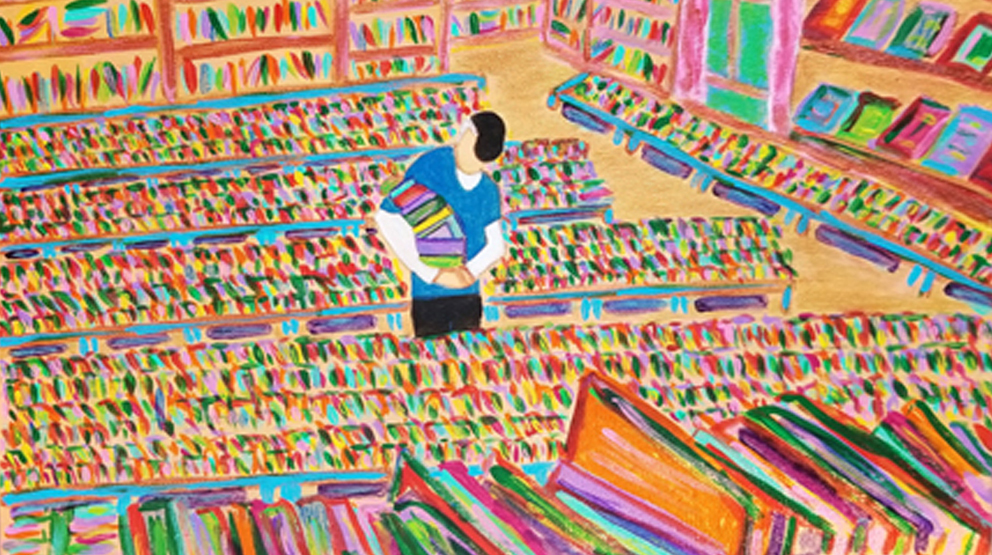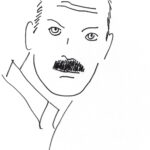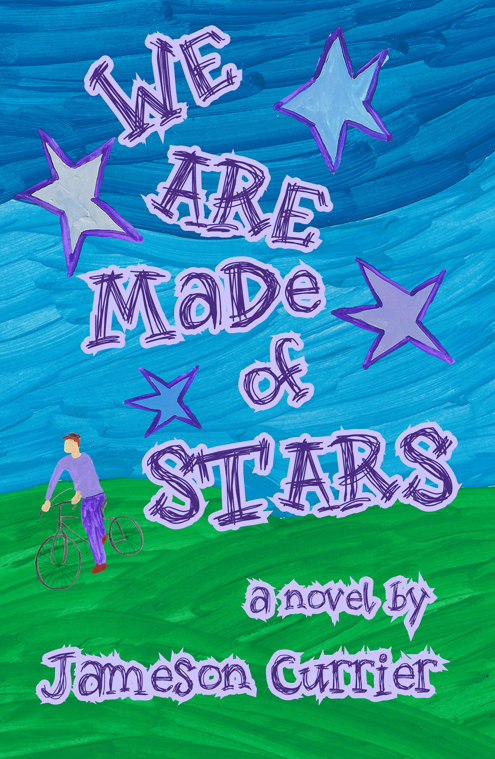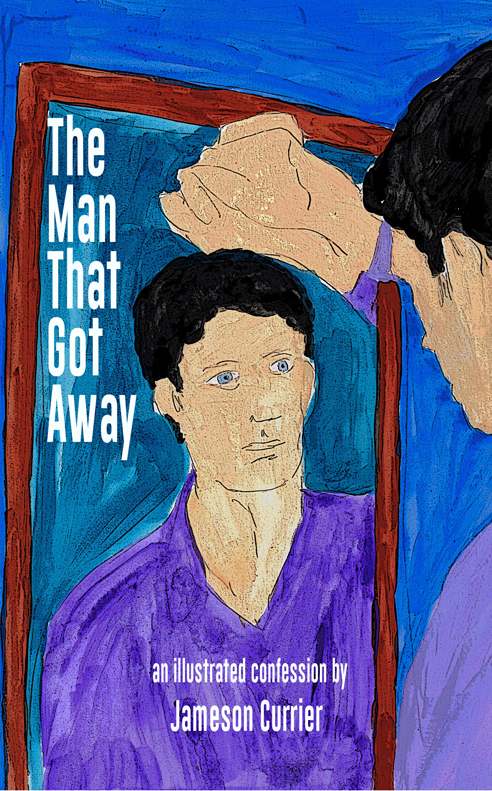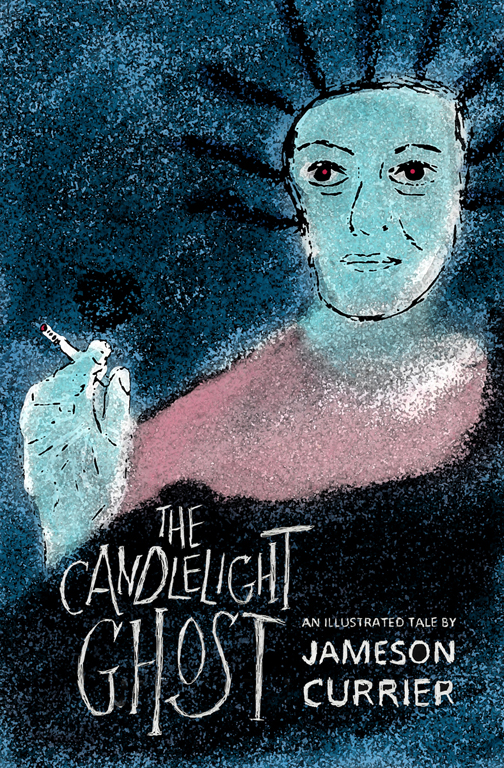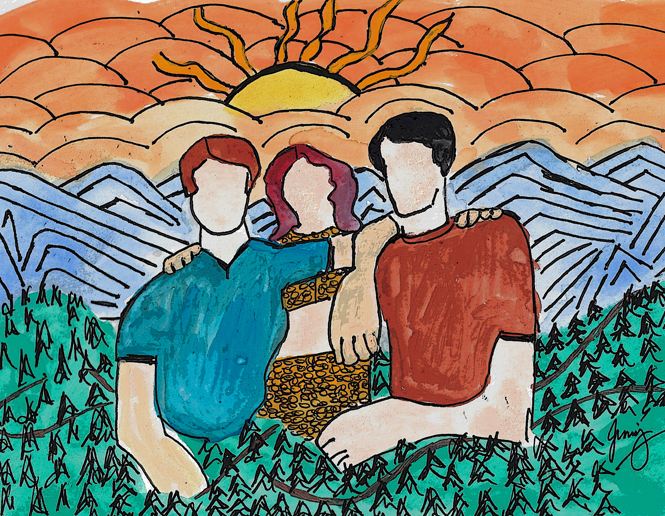
illustration by Jameson Currier
THE ABSOLUTE WORST
by Jameson Currier
Stuck in traffic waiting to cross the Potomac River into Virginia, Katie adjusted the rear view mirror so she could see Bryan in the back seat of the car. She had not really kidnapped him; if she were to be pulled over now by the police, she felt certain she could explain it all in a simple, though stumbling, way. Bryan had been in the hospital for over ten days, fighting first pneumonia, then a viral infection, and then had been kept for more tests and had developed another infection. Katie had asked Bryan’s doctor, a small perfunctory man, if it were possible to take Bryan out of the hospital for a few hours one afternoon. “Absolutely not,” the doctor had replied. “Unheard of,” another doctor answered. And when Katie tried to explain that she wanted to take Bryan to see a friend who was now homebound, that she felt the trip would only help Bryan, help both of them, the doctors stared at her as though she were speaking a foreign language, a language they showed no interest in wanting to understand.
But Katie had been persistent. She had only recently discovered that Chris was living at his father’s house. Not living really, she amended in her mind, dying. And she knew Bryan’s spirits were slipping and she wanted, no, she had to bring Chris and Bryan together again; they had not seen each other in almost four years. She had discussed the possibility of the trip with a hospital administrator, an unyielding heavyset woman, who had assured her it could be medically done, but had refused to allow Katie to do it. Katie had consulted with the interns and the nurses, mentioned it to the cafeteria staff, described it to visitors and even other patients, anyone who would listen to her. It had become the most important obsession in her life, but even deeper, more passionately, she felt that it was something that could keep both Bryan and Chris alive. This morning, while she was reading a magazine in Bryan’s room waiting for him to wake up, a nurse opened the door and said, “Just do it. We’ll all cover for you. But you have to have him back in three hours.”
Now Katie looked again in the mirror, trying to see how Bryan was holding up. His eyes were closed, as though he were sleeping. But was he sleeping or was he unconscious? She thought he looked distressed, as if blood were not passing through his face, and she had a sudden, horrible thought: what if he were to die here, in the car? Would she then be responsible for his death? Would that make her a murderer? He won’t, she decided. Somewhere she had heard that, if you think something hard enough, you can will it to happen. Or not to happen. He won’t, he won’t, he won’t die. Not in the car. Not in this car. Then it occurred to her that maybe Bryan didn’t even know where they were going, or wasn’t even aware he was riding in a car. She had never discussed the trip with him, wanting to keep seeing Chris again as a surprise.
And then everything had happened so fast. A nurse had brought a wheelchair, a security guard had helped Bryan into the car. And Katie had been a rapid fire of questions. Should he eat? What should he drink? What happens if he passes out, vomits, his fever rises?
Why had she been so persistent? Wasn’t this a foolish idea? Not even the weather had cooperated; a light drizzle painted the city with a November chill. Now she was stuck in traffic and reduced to a hysterical panic beneath a billboard for mint-flavored mouthwash. What is the worst that can happen? she thought. There must be something worse than this.
* * *
Things had begun to fall apart about three years ago, when Bryan met Katie at a coffee shop near Dupont Circle and said he had tested positive. Bryan had become again, at that point, a day-to-day part of Katie’s life. They spoke on the phone, cooked dinner for one another, went shopping and to the movies together. That day Katie had watched Bryan’s mouth move through words like “monitor” and “drugs,” but the sentences fell apart, words shattered on the ground. All she could think was that it was now moving in closer, happening to her. Not that it had eluded her world before; she and Bryan had both known friends who had been diagnosed and had died. Bryan had also volunteered as a buddy for over a year and now worked on the switchboard on Thursday nights, the same night Katie delivered meals to homebound patients in her neighborhood. “It” was a subject that was, unfortunately, very commonplace in their lives. In fact, only a few weeks before, she had encouraged Bryan to get tested.
She knew the news wouldn’t have hit her so hard if things in her own life had not started to unravel. Ellen, her lover, had finally left her and moved to Seattle. And Katie had immersed herself in support groups, twelve-step programs, and private therapy to try to stop drinking, to stop smoking, and to get out of the house and over the relationship. She felt her life had been reduced to tearful nights on the floor, floundering through spasms of misery, wanting a drink or a cigarette, or Ellen to come back and say she had made a mistake. And now to all this she had to add the thought of Bryan possibly dying, when she felt he was the only thing she had left to make her go on.
She had stared at Bryan that day and thought he didn’t look different. He did not seem depressed, sad, desperate. He was talking in a low, calm voice. But wasn’t that the way Bryan always was? Cool, academic, rational? Then Bryan said that he was hesitant about mentioning all of this, because he knew it would set her back. Set her back? Of course it would; all she could think about was could she order alcohol at this restaurant, who could she bum a cigarette from, had Ellen left any Valium in the bathroom cabinet? But instead she had sat there and said, “Excuse me,” and began to take deep breaths.
Bryan had flushed and became alarmed. “Are you all right?”
“Of course,” she had answered in a tone she felt was too bitter.
“I’m all right. I’m just trying to stay calm.”
* * *
And then word came to Katie of other friends. Gene, a friend from high school, had developed cryptococcal meningitis. Darren, a co-worker, was now going blind from cytomegalovirus. Olivia, a woman in her support group, confided she had passed out after hearing the result of her lover’s blood test. And then two of her homebound clients on Thursday nights died the same week. It got to the point where Katie could not answer the phone, could not watch TV, could not do anything to escape it except take long solitary walks through the darkened streets near Dupont Circle. But even that could not stop her from thinking. Or stop the infuriating need to drink or smoke. Every night, on her way home, she stopped and bought a donut or candy bar or an ice-cream cone—something, anything that just made her feel instantly better. And then she would say to herself, If I can just make it to the fall. If I can just make it to the end of the month, the end of the week, the end of tomorrow, everything will get better, has to get better.
Autumn came and went. Katie gained fifteen pounds. Some things did get better. But others became much worse.
* * *
The worst that can happen, Katie thought when she had parked the car in the driveway, is that Chris would not want to see Bryan. Or what if he couldn’t see Bryan, what if Chris had developed a reaction to some drug and couldn’t see at all? Or even worse, what if Chris had died since she had phoned the house from the hospital?
She opened the back door of the car and leaned inside, stirring Bryan awake. As she began to untangle a blanket from beneath him, she noticed the front door of the house open, heard the wood snap, and watched a young, red-haired girl, short and chunky, approach the car, parting the misty gray air like a torch.
“I’m Donna,” the girl said, only now Katie could tell she was much older, a woman really, a few years older than herself. “We spoke on the phone. I help take care of Chris.”
Donna leaned into the car and pressed her hand against Bryan’s brow. “We have a wheelchair inside. Let me go get it.”
Thank goodness she knows what to do, Katie thought. Thank goodness there is someone in charge.
Inside, Chris was sleeping, propped up in a large upholstered armchair in a wood-paneled den. Katie and Donna wheeled Bryan up beside the chair. Katie took a good look at Chris; if she hadn’t known it was him, she would have never recognized him. His body was covered with small bluish lesions; his bones poked out from beneath his robe, like coat hangers suspending unworn clothing. She turned to Bryan, hoping that he might not have recognized Chris, that they could just leave before he realized who it was, but she detected the furious stare Bryan was already giving Chris. Unable to watch the horror fighting through Bryan’s face, Katie turned away, toward the TV set, where a game show was playing without any sound. Donna reached for Katie’s hand and said, “Let’s leave them alone a bit.”
This was the most foolish thing in the world to do, Katie thought as she followed Donna through the room. Bringing Bryan here, being here herself. She stopped and noticed, through the window, Chris’ father, wearing a bright-orange parka, raking leaves into tiny brown mounds on the lawn.
“Mr. Pearson thought it best if he stayed out of the way,” Donna said.
Katie turned and looked at Bryan again, watching him watching Chris sleep.
* * *
Katie believed she and Bryan had begun their friendship by watching Chris. It was hard not to notice him their freshman year in college; Chris, with bushy black hair and bright-blue eyes, bounced around the campus in jeans and a bright-yellow sweatshirt, so illogical against the somber buildings of Georgetown. Bryan and Katie met when they realized they shared two classes together back to back—Biology 101 and Introduction to Western Civilization. Crisscrossing the campus in those days, they noticed Chris at the cafeteria, the bookstore, the library, his sweatshirt instantly identifiable. A few weeks later, they met at an audition for the campus choral group; Bryan and Chris had struck up a conversation about a group of guys who had eerily begun singing Gregorian chants in the basement of a dorm, and Katie, sitting between them, turned her head from side to side, not knowing what to say, but willing herself to be noticed, a part of their conversation.
Katie hadn’t known they were gay in those days, or that Bryan and Chris were stumbling through those thoughts themselves at the time. But as she sat through more conversations on Broadway shows and MGM musicals, discussions about the harmonics of Chuck Mangione and The Manhattan Transfer, it occurred to her that something was happening between the two of them which she didn’t understand. It came as no surprise a few months later when she listened to their heartfelt confessions of crushes on one another; she had already made the connection herself. And she felt both protector and protected as she began to explore a new world with them—a nightlife of bars and clubs and discos—a world that intrigued Chris, disheartened Bryan, and satisfied Katie, because it allowed her to learn to enjoy the company of gay men.
It came as no surprise to her either when Chris announced a year or so later that he and Bryan were now involved with one another, and would she be interested in sharing an off-campus apartment with them. The three of them traveled everywhere together—to the mall, to the beach, to New York to see a show—inseparable everywhere except in the bedroom. But Bryan and Chris never made Katie feel left out or like a third wheel; in fact, they relished her opinions as much as she did their confidences. They had even traveled to Europe together, renting a car the summer after graduation and driving from Paris to Rome and then back to Paris. By then Katie had also begun to silently question her own sexuality, aware that Bryan and Chris made her feel more attractive and special than the campus boys she had dated. She had even devised an explanation of her relationship with Bryan and Chris: they were, in her mind, her surrogate family.
So it did come as a surprise that after returning from Europe Bryan moved to New York to begin graduate school at Columbia and Chris stayed behind in Washington. Katie had been unaware that their relationship was splintering; there had been no tangible argument or misunderstanding. She was only able to understand it years later, looking back at the past. They had all been very different types of people who had been together at the same point in their lives and were now moving on to other points, becoming the people they were supposed to be, wanted to be.
Bryan began moving in more academic circles, began teaching college, and going to the opera, ballet, and Europe again. Chris floundered through a variety of jobs, hung out at the clubs and bars and gyms, then moved to New York himself and flirted with the idea of becoming an actor, before settling into a career in advertising. Katie took a job with a small publishing firm, then years later accepted a magazine assignment in New York, where she met Ellen. Still Katie and Bryan and Chris came together every so often, for dinner, to celebrate a birthday, for a rendezvous at the beach, and though their differences had become more apparent and striking, it was still obvious they were happy when their lives could intersect, even for just a few hours.
Katie had once tried to explain all this to Ellen, how sometimes people move away to become other people, but that doesn’t mean that they will never get along again, cannot still be friends. Ellen grew into an adamant and headstrong woman, however; she felt everyone should be, think, just as she did. Abused as a child, Ellen had always been mistrustful of men; she couldn’t understand how Katie could feel comfortable in the company of men, even gay men. But, then, Ellen saw everyone as a potential threat; she could become jealous of even another woman’s stray comment. Their relationship had begun at a time when Katie needed someone with a firm sense of direction. She had moved to a new city, begun a new job, and felt for the first time she had been misplaced. Ellen had wooed Katie with such urgency that her own sexual awakening came like a spiritual revelation. If Ellen had had her way, they would have joined a commune made up solely of lesbians. Instead they had compromised and moved to Washington, where Ellen began working as a lobbyist, growing angrier and angrier as she battered her head against the establishment. Katie returned to her old job at the publishing firm and soon became aware that what she needed from Ellen—wanted, in fact—was something more than what existed in the bedroom. What she wanted was someone more like herself. That was at the same time she had heard that Bryan had moved to Washington, accepting a position to teach at a college in suburban Maryland.
* * *
Mr. Pearson was burning the piles of leaves in the back yard, and Katie watched from the kitchen window the smoke rise and swirl into the murky drizzle.
“He’s not much of a talker either,” Donna said when she joined Katie in the kitchen. Donna had hooked Bryan up to a respirator which was kept in the house for Chris, and Bryan had quickly fallen asleep.
Everyone has a horror story, Katie thought. Mr. Pearson’s wife had died of cancer last year. Donna’s sister had contracted the virus from a blood transfusion she had needed during an appendectomy. When Donna’s sister died, Donna began training as a home caretaker. “None of those doctors understand any of this,” she had told Katie. “What’s worse, they have no compassion.”
The worst thing that had happened to Chris was that he had discovered a lesion behind his left ear which a doctor had diagnosed as Kaposi’s sarcoma. Chris began chemotherapy and then lost his job. He went on disability for a while, then moved to Washington and lived with a friend who was also ill. The friend was evicted, and Chris had landed in the hospital. When he was released he decided to live with his father in Virginia. Katie had only learned Chris was in Virginia last week, when she had taken a break from seeing Bryan in the hospital to help with a mailing for contributions for the meal service. She overheard a co-worker mention that Chris Pearson had moved. Katie and Bryan had lost track of Chris in the last year and a half, had not realized he was back in Washington; they had been absorbed too deeply in their own crisis. Or was there a deeper, more profound reason—that maybe both Bryan and Chris were both too proud and too ashamed to admit to one another that they had fallen ill? There were times when Katie thought about trying to find Chris, but something prevented it, held her back. She knew it was her fear. If Bryan was sick—calm, rational Bryan—wouldn’t that mean breezy, impulsive Chris might be, too? Or worse—perhaps he was already dead? Now Katie felt the worst thing that could have happened was that each might not have even known the other was sick. Or even worse, the absolute worst—she might not ever have been able to bring them back together again.
“You look fab-u-lous,” Chris punctuated the syllables when he was awake and Katie sat on the edge of his chair. But before she could feel self-conscious, Chris turned his head toward Bryan and said, “But her, what happened to her?”
What had happened was that Bryan’s T cells began to drop; he developed thrush first, then began a PCP prophylaxis, TMP/SMX. He developed mild allergic reactions and was switched to dapsone when it was discovered he had already developed toxoplasmosis, a parasite that infects the brain. When he began to have seizures, the dapsone was stopped and he developed pneumonia. But Katie told Chris none of this. Instead, she ran her fingers lightly across his arm and said, “Just some bad luck.”
“Bad luck?” Chris smirked and Katie watched him chew the words around in his mind. “Is that the worst, the absolute worst?”
* * *
What is the worst that can happen? The absolute worst? A game played many times over the years. It had started during their trip through Europe. While driving through the countryside they began playing silly games to pass the time—first I Spy, then License Plate. Later they began creating their own games; their favorite became Parents and Child. The two riding in the front seat were the Parents, the one in the back became the Child. It was the purpose of the Child to ask simple questions of the Parents, whose object was to reply in the most ridiculous manner possible. For example, the Child could ask, “How tall is the mountain? How wide is the river?” And the Parents would reply, “That mountain is taller than 150 seven-foot-tall men standing on top of each other.” Or, “That river is wider than two hundred floating pregnant women.” Katie always enjoyed playing Child more than Parent; she would sit forever in the back seat asking endlessly annoying questions.
Then one day, a day that had begun with a frustrating sequence of events—a flat tire, no gas station, not enough of the right currency—Parents and Child evolved into What Is The Worst That Can Happen? The “worst” was not intended to alarm the players; instead, it was created to inspire them with a sort of cynical hope: thinking of the absolute worst thing that could happen (for instance, the car could have been totaled and they could be broke) made what had happened (a flat tire and nothing but change) seem not that bad at all. Over the years, as they met again, spoke on the phone, and complained about jobs and lovers and money and weight, conversations began to end and begin with the question, “But is that the worst, the absolute worst?”
* * *
Chris did not stay awake for long, and Katie and Donna sat in the kitchen clutching coffee mugs. Mr. Pearson came inside, smelling of wet, smoking leaves. Katie had not seen him in over thirteen years, since her college graduation, but she was aware as they greeted one another that their misfortunes were erasing the awkwardness of time.
“Did you know Hal?” Mr. Pearson asked, washing his hands at the sink.
“Hal?” Katie answered. “No. I don’t think so.”
“Someone called last night and said he had died. I didn’t tell him yet.”
“Now, now,” Donna interrupted. “We don’t need to tell him nothing. We just want to keep him comfortable.”
Comfortable? Katie thought. In a house in the suburbs, a world so far removed from the one Chris had made his own? “I can tell him when he wakes up again,” Katie said.
“No, that’s all right,” Mr. Pearson answered, and looked at Donna. “I guess we shouldn’t make him feel any worse.”
Katie noticed something pass between Donna and Mr. Pearson. What she saw was Mr. Pearson looking at Donna, Donna averting her eyes, smoothing her hair, a light tremble in her fingertips. She saw Mr. Pearson shuffling his feet, looking first at the floor, then out the window. It occurred to Katie that what was passing between them stretched beyond the boundaries of compassion. This was new love, she realized, testing and groping and tempting. Out of all this mess, life has to go on, she thought. She stood and said, “I’ll go check on Bryan,” leaving them alone, willing them to continue their looks and tension and sparks.
She sat beside Bryan, feeling foolish again. She turned and watched Chris sleeping, then looked again at Bryan, his closed eyelids fluttering as though he were dreaming. And then it occurred to Katie that there must have been a reason she had brought them back together. Was it because they had loved each other? Was it because she still loved them? Or was it because she had never expressed her love for them in the simple, passionate way she had once witnessed them share with each other?
And then what Katie remembered was the Alpine moonlight, the low soft moans, the shadows against a wall. What had happened was they had found a hostel outside of Innsbruck and had taken a room that had two double beds. Katie, tired from the drive and the mountain air, had fallen asleep quickly. Bryan and Chris had stayed awake, talking and planning the next day’s trip. Sometime in the middle of the night Katie awoke with a chill. As she turned over and curled tighter into the blanket she heard the other bed creak. When she opened her eyes she noticed, from the splinters of moonlight which leaked into the room, Chris’s head rising and falling over Bryan’s body. She heard their heavy breathing, then noticed Bryan, lifting, turning himself so that he was now on top of Chris, and she quietly drew them in closer, willed her eyes to drink in more light. What she saw was one of the most breathtaking experiences of her life, as moving and majestic as the European scenery. It was Bryan making love to Chris, Chris making love to Bryan, their arms and legs and bodies rising and falling in the chilly blue light.
She had re-created that night in her mind for years, had even tried to recapture the sensation of it with Ellen. It had always bothered Katie that she and Ellen had never achieved the type of easy relationship Bryan and Chris had. But it had always bothered her, too, that Bryan and Chris had lost touch with one another. Had something that had meant so much to her to observe, meant so little to Bryan and Chris? Had they forgotten what they had felt for one another, or had Katie just imagined it, bit by bit by bit? Or did people just grow apart, move away from one another without looking back, without wanting to look back, as she and Ellen had done?
And then Katie felt discouraged, defeated. The visit had not gone as she had imagined. Bryan and Chris had not even been awake at the same time. What Katie had hoped for, had hoped to resurrect between Bryan and Chris, had not occurred. She began to worry that perhaps the trip had done more damage than good. Bryan seemed to have gotten worse since they arrived at the house. And she had only shown Chris that Bryan was also sick. What was worse, she might have destroyed, in her own mind, the passion of Bryan and Chris’s relationship. After all these years, had she merely imagined it?
And now she had the worry of the drive back; she checked her watch and realized she was running late. How many doctors would yell at her? Would the hospital blame her if Bryan’s condition worsened?
She found her purse and her coat and went into the kitchen to say goodbye. Mr. Pearson had retreated back outside, and Donna was preparing an IV solution she would later give to Chris.
“I’ll help you get him back out to the car,” Donna said.
While Donna was unhooking the respirator from Bryan, Bryan stirred into consciousness. He gave Donna a wide-eyed look, like a child who has just emerged from underwater. He looked around the room slowly, taking in Katie in her coat, the silent TV, the dark heavy paneling, then Chris, sleeping beside him. He lifted his hand a few inches into the air and placed it against a crease of Chris’s robe, then his eyes searched through the air till they locked with Katie’s. “No,” Bryan said, in a rasp that cut through the silence of the room. “Not yet.”
* * *
Later, as she was driving Bryan back to the hospital, traffic snarled where the highway ramp swept over the Potomac. Katie adjusted the mirror and looked at Bryan in the back seat, noticing he was awake, looking out at the view of the river and the buildings and the monuments. Now she imagined them playing another round of Parents and Child, but the questions kept twisting, darkening in her mind. Why did this happen? How many people will become infected? What will we learn from the great plague of AIDS? What is the worst, the absolute worst that can happen?
Two friends will die, leaving one to tell their story. That is the worst, the absolute worst, that can happen.
__________
“The Absolute Worst” first appeared in the author’s collection Dancing on the Moon: Short Stories About AIDS, published in hardcover by Viking in 1993 and in paperback by Penguin in 1994.
